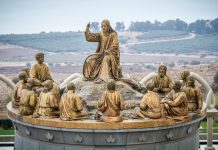
by Alice Pfeifer, CSA
This Complete-A-Project Bible Search activity is for teacher and students (grades 4-6) working together. Use the Bible to answer the questions on the activity sheet [CLICK HERE]. This Bible Search is based on Matthew 22:15-21.
Background
* This Gospel begins with some Herodians and some disciples of the Pharisees asking Jesus a question.
* The Pharisees are respected religious leaders and teachers in the time of Jesus. The Herodians are members of the court of King Herod, who rules over a part of Palestine during this time. Caesar is the Roman emperor who rules over a big part of the world in the time of Jesus, including all of Palestine.
* The disciples of the Pharisees and the Heordians are being big hypocrites when they ask Jesus the question in this Gospel. They pretend to want an answer to a difficult question. What they really want is to trap Jesus. They hold malice in their hearts toward him.
* The Pharisees and Herodians dislike Jesus because he knows they are hypocrites. He knows they are jealous of him and mistrustful of his popularity. He knows they dislike his teachings. They think that being rich and powerful gives them status, and that having status is more important than being faithful to God and caring for God’s people.
* The trick question these men ask is about taxes. Now, the Pharisees and Herodians don’t mind paying taxes because they are rich, and they want to keep the peace with Caesar.
* One reason the Pharisees are rich is that they cheat poor people out of their money. In Palestine during Jesus’ time there are two kinds of money—Roman and Jewish—and there is a rule that only Jewish money can be used at the Temple. So when poor people go to worship at the Temple, they bring with them the Roman money they earn at their jobs. In the Temple courtyard, the Pharisees have booths where people buy Jewish money with their Roman money. But the Pharisees overcharge. For example, they might give back only one Jewish coin for two Roman coins.
* The Pharisees and Herodians can hardly wait to ask Jesus their trick question. If he answers yes, then he will lose popularity with the people, who hate paying taxes to Caesar. But if he answers no, he will make Caesar angry and could end up in jail—or even worse.
Answers: Pharisees, Teacher, truthful, Caesar, malice, hypocrites, Roman, Caesar’s, what belongs to Caesar, what belongs to God
Guide and activity sheet by Alice Pfeifer, CSA. Art by Ansgar Holmberg, CSJ.
MATERIALS
* Copies of the activity sheet [CLICK HERE], one copy for each student
* Bibles (The Search is based on the New American Bible.)
* Pencils or pens
* Ten playing cards, an ace (to serve as 1) through 9
* Chalk board (or poster board)
PROCEDURE
1. Before students arrive, write on the chalk board the following words (found in bold type in Background): Pharisees, Herodians, Herod, Caesar, hypocrites, malice, status.
2. Introduce Matthew 22:15-21 by explaining that the Gospel is about a trick question Jesus has to answer about authority and what is owed to the emperor and what is owed to God.
3. Read Background (or summarize it in your own words). To help students recognize words they will read in the Gospel, have a student point to each word on the chalk board as you say it.
4. Use the following questions to help students understand the meanings of the words on the chalk board: What does it mean for a person to have status? (He or she is important.) If people have malice in their hearts, what does that mean? (They have hateful thoughts or intentions.) If I say some people are hypocrites, what does that mean? (They are phonies. They pretend to be better than they are.) Who were the Herodians in Jesus day? Who were the Pharisees? Who was Herod? Who was Caesar?
5. Have a student read the opening to the story about J.J. on the activity sheet. Then explain that the Gospel about the trick question put to Jesus will help us understand a lesson that J.J. learns. Read the Gospel while students follow along in their Bibles, or have students take turns reading it.
6. Have students close their Bibles and work individually or in pairs to answer the ten questions. Then read the correct answers and let students see how many they got right.
7. Have a student read the closing to the story about J.J.
8. Reinforce the details of this Gospel with the following memory exercise: Spread face down on a table ten playing cards ace (1) through 9, in random order. (The number on each card corresponds to the same numbered question on the activity sheet.) Have students take turns “drawing” a card and answering the corresponding question.
Copyright 2011, Bayard, Inc. All rights reserved. This article is protected by United States copyright and other intellectual property laws and may not be reproduced, rewritten, distributed, redisseminated, transmitted, displayed, published or broadcast, directly or indirectly, in any medium without the prior written permission of Bayard, Inc.
This article was written by the Catechist Staff and appeared in Catechist magazine, September 2011.
Image Credit: Shutter Stock 6709591




